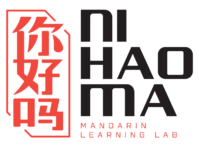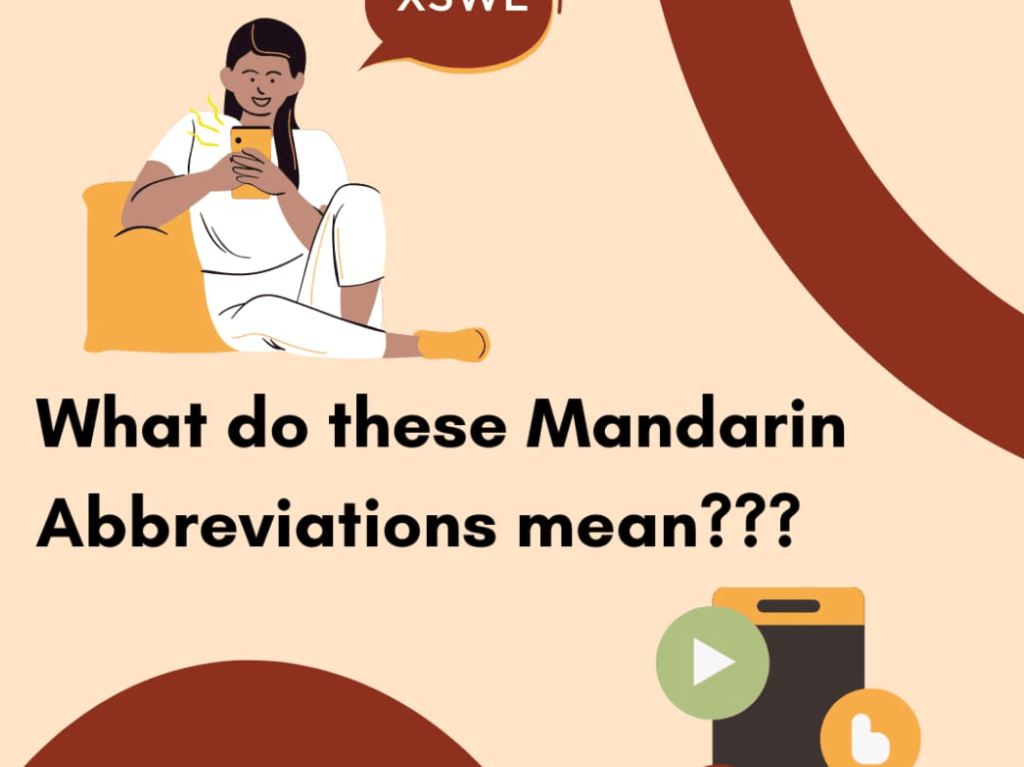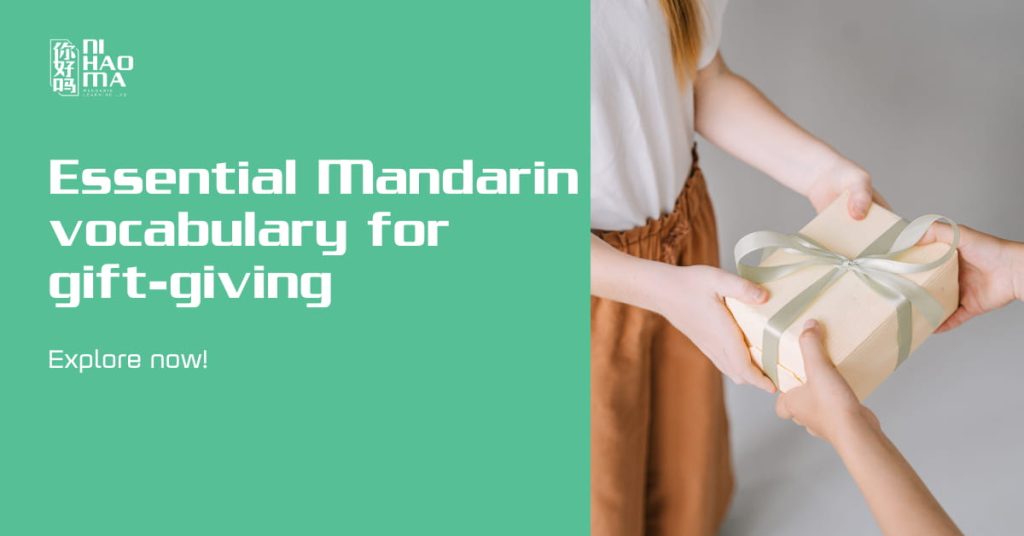To achieve the HSK 3 certificate, mastering vocabulary is a key factor. This level requires learners to be able to use words more flexibly in various contexts. Understanding this, Ni Hao Ma has compiled HSK 3 vocabulary with detailed illustrative examples, helping you not only memorize but also understand how to use each word.
HSK 3 Vocabulary List
How many words are there in HSK 3? HSK 3, within the international Chinese proficiency test system, requires learners to master all 300 words from HSK 1 and HSK 2, plus approximately 300 new words for the HSK 3 level. Thus, in total, you need to master 600 HSK 3 vocabulary words. With this amount of vocabulary, learners are expected to be able to communicate in familiar situations, engage in basic exchanges at work, school, or when traveling in China.
Right below, Ni Hao Ma will introduce you to 300 HSK 3 vocabulary words with examples:
| No | Chinese | Pinyin | English | Examples |
| 1 | 阿姨 | āyí | aunt | 阿姨好!(āyí hǎo! – Hello, auntie!) |
| 2 | 啊 | a | ah, huh (exclamatory/interrogative particle) | 真漂亮啊!(zhēn piàoliang a! – So beautiful!) |
| 3 | 矮 | ǎi | short | 他个子很矮。(tā gèzi hěn ǎi. – He is short.) |
| 4 | 爱好 | àihào | hobby | 我的爱好是看书。(wǒ de àihào shì kànshū. – My hobby is reading.) |
| 5 | 安静 | ānjìng | quiet | 请安静!(qǐng ānjìng! – Please be quiet!) |
| 6 | 把 | bǎ | to hold, to take (preposition for direct object) | 请把门关上。(qǐng bǎ mén guānshàng. – Please close the door.) |
| 7 | 班 | bān | class | 我们是同班同学。(wǒmen shì tóng bān tóngxué. – We are classmates.) |
| 8 | 搬 | bān | to move | 我要搬家了。(wǒ yào bān jiā le. – I’m moving house.) |
| 9 | 半 | bàn | half | 现在是半小时。(xiànzài shì bàn xiǎoshí. – It’s half an hour now.) |
| 10 | 办法 | bànfǎ | method, way | 我没有办法。(wǒ méiyǒu bànfǎ. – I have no way.) |
| 11 | 办公室 | bàngōngshì | office | 他在办公室里。(tā zài bàngōngshì lǐ. – He is in the office.) |
| 12 | 帮忙 | bāngmáng | to help | 谢谢你帮忙。(xièxie nǐ bāngmáng. – Thank you for your help.) |
| 13 | 包 | bāo | bag, package | 我有一个包。(wǒ yǒu yī gè bāo. – I have a bag.) |
| 14 | 饱 | bǎo | full (from eating) | 我吃饱了。(wǒ chī bǎo le. – I’m full.) |
| 15 | 北方 | běifāng | north | 他住在北方。(tā zhù zài běifāng. – He lives in the north.) |
| 16 | 被 | bèi | by (passive voice marker) | 书被他拿走了。(shū bèi tā ná zǒu le. – The book was taken by him.) |
| 17 | 鼻子 | bízi | nose | 她的鼻子很小。(tā de bízi hěn xiǎo. – Her nose is small.) |
| 18 | 比较 | bǐjiào | relatively, comparatively | 这件衣服比较贵。(zhè jiàn yīfu bǐjiào guì. – This dress is relatively expensive.) |
| 19 | 比赛 | bǐsài | competition, match | 我们要看比赛。(wǒmen yào kàn bǐsài. – We want to watch the match.) |
| 20 | 笔记本 | bǐjìběn | notebook, laptop | 我用笔记本学习。(wǒ yòng bǐjìběn xuéxí. – I study using a laptop.) |
| 21 | 必须 | bìxū | must, have to | 你必须来。(nǐ bìxū lái. – You must come.) |
| 22 | 变化 | biànhuà | change | 这里变化很大。(zhèlǐ biànhuà hěn dà. – The changes here are big.) |
| 23 | 别人 | biéren | others | 不要打扰别人。(bùyào dǎrǎo biéren. – Don’t disturb others.) |
| 24 | 冰箱 | bīngxiāng | refrigerator | 苹果在冰箱里。(píngguǒ zài bīngxiāng lǐ. – The apples are in the refrigerator.) |
| 25 | 菜单 | càidān | menu | 服务员,菜单!(fúwùyuán, càidān! – Waiter, the menu!) |
| 26 | 参加 | cānjiā | to participate in | 我想参加这个活动。(wǒ xiǎng cānjiā zhège huódòng. – I want to participate in this activity.) |
| 27 | 草 | cǎo | grass | 小草绿了。(xiǎo cǎo lǜ le. – The grass has turned green.) |
| 28 | 层 | céng | layer, floor (of a building) | 我住在五层。(wǒ zhù zài wǔ céng. – I live on the fifth floor.) |
| 29 | 差 | chà | lacking, short of | 我差五分钟就迟到了。(wǒ chà wǔ fēnzhōng jiù chídào le. – I was almost five minutes late.) |
| 30 | 超市 | chāoshì | supermarket | 我要去超市买东西。(wǒ yào qù chāoshì mǎi dōngxī. – I want to go to the supermarket to buy things.) |
| 31 | 衬衫 | chènshān | shirt | 这件衬衫很漂亮。(zhè jiàn chènshān hěn piàoliang. – This shirt is very beautiful.) |
| 32 | 成绩 | chéngjì | achievement, grades | 他的成绩很好。(tā de chéngjì hěn hǎo. – His grades are very good.) |
| 33 | 城市 | chéngshì | city | 这个城市很大。(zhège chéngshì hěn dà. – This city is very big.) |
| 34 | 迟到 | chídào | to be late | 他经常迟到。(tā jīngcháng chídào. – He is often late.) |
| 35 | 除了 | chúle | except for, besides | 除了他,大家都在。(chúle tā, dàjiā dōu zài. – Everyone is here except for him.) |
| 36 | 船 | chuán | boat, ship | 我们坐船去。(wǒmen zuò chuán qù. – We’re going by boat.) |
| 37 | 春 | chūn | spring | 春天来了。(chūntiān lái le. – Spring has come.) |
| 38 | 词典 | cídiǎn | dictionary | 我有一本词典。(wǒ yǒu yī běn cídiǎn. – I have a dictionary.) |
| 39 | 聪明 | cōngming | clever, smart | 她是个聪明的孩子。(tā shì gè cōngming de háizi. – She is a smart child.) |
| 40 | 打扫 | dǎsǎo | to clean | 我要打扫房间。(wǒ yào dǎsǎo fángjiān. – I want to clean the room.) |
| 41 | 打算 | dǎsuàn | to plan, to intend | 你打算什么时候去?(nǐ dǎsuàn shénme shíhou qù? – When do you plan to go?) |
| 42 | 带 | dài | to bring, to take | 他带着帽子。(tā dàizhe màozi. – He is wearing a hat.) |
| 43 | 担心 | dānxīn | to worry | 我很担心你。(wǒ hěn dānxīn nǐ. – I’m very worried about you.) |
| 44 | 蛋糕 | dàngāo | cake | 我喜欢吃蛋糕。(wǒ xǐhuān chī dàngāo. – I like to eat cake.) |
| 45 | 当然 | dāngrán | of course | 当然可以。(dāngrán kěyǐ. – Of course you can.) |
| 46 | 地 | de | (adverbial particle) | 他高兴地笑了。(tā gāoxìng de xiào le. – He smiled happily.) |
| 47 | 灯 | dēng | lamp, light | 请关灯。(qǐng guān dēng. – Please turn off the light.) |
| 48 | 地方 | dìfang | place | 这是一个好地方。(zhè shì yī gè hǎo dìfang. – This is a good place.) |
| 49 | 地铁 | dìtiě | subway, metro | 我坐地铁去上班。(wǒ zuò dìtiě qù shàngbān. – I take the subway to work.) |
| 50 | 地图 | dìtú | map | 我需要一张地图。(wǒ xūyào yī zhāng dìtú. – I need a map.) |

| No | Chinese | Pinyin | English | Examples |
| 51 | 电梯 | diàntī | escalator, elevator | 我们坐电梯上去。(wǒmen zuò diàntī shàngqù. – We’re going up by elevator.) |
| 52 | 电子邮件 | diànzǐyóujiàn | 我给你发了电子邮件。(wǒ gěi nǐ fā le diànzǐyóujiàn. – I sent you an email.) | |
| 53 | 东 | dōng | East | 商店在东边。(shāngdiàn zài dōng biān. – The shop is on the East side.) |
| 54 | 冬 | dōng | winter | 冬天很冷。(dōngtiān hěn lěng. – Winter is very cold.) |
| 55 | 动物 | dòngwù | animal | 我喜欢小动物。(wǒ xǐhuān xiǎo dòngwù. – I like small animals.) |
| 56 | 短 | duǎn | short | 他的头发很短。(tā de tóufà hěn duǎn. – His hair is short.) |
| 57 | 段 | duàn | section, segment (of text, road) | 请读这段话。(qǐng dú zhè duàn huà. – Please read this paragraph.) |
| 58 | 锻炼 | duànliàn | to exercise, to train | 我每天都锻炼身体。(wǒ měitiān dōu duànliàn shēntǐ. – I exercise every day.) |
| 59 | 多么 | duōme | how (exclamatory), such | 这花多么漂亮啊!(zhè huā duōme piàoliang a! – How beautiful this flower is!) |
| 60 | 饿 | è | hungry | 我很饿了。(wǒ hěn è le. – I’m hungry.) |
| 61 | 不但……而且…… | búdàn…érqiě… | not only… but also… | 她不但会说中文,而且说得很好。(tā búdàn huì shuō Zhōngwén, érqiě shuō de hěn hǎo. – She not only speaks Chinese, but speaks it very well.) |
| 62 | 耳朵 | ěrduo | ear | 他的耳朵很大。(tā de ěrduo hěn dà. – His ears are big.) |
| 63 | 发 | fā | to send, to issue | 我给你发短信。(wǒ gěi nǐ fā duǎnxìn. – I’ll send you a message.) |
| 64 | 发烧 | fāshāo | to have a fever | 我发烧了。(wǒ fāshāo le. – I have a fever.) |
| 65 | 发现 | fāxiàn | to discover, to find out | 我发现了一个问题。(wǒ fāxiàn le yī gè wèntí. – I discovered a problem.) |
| 66 | 方便 | fāngbiàn | convenient | 这里交通很方便。(zhèlǐ jiāotōng hěn fāngbiàn. – The transportation here is very convenient.) |
| 67 | 放 | fàng | to put, to place, to release | 请把书放在桌子上。(qǐng bǎ shū fàng zài zhuōzi shàng. – Please put the book on the table.) |
| 68 | 放心 | fàngxīn | to rest assured, don’t worry | 请放心,我会处理好的。(qǐng fàngxīn, wǒ huì chǔlǐ hǎo de. – Please rest assured, I will handle it well.) |
| 69 | 分 | fēn | minute, point, part | 现在是八点十分。(xiànzài shì bā diǎn shí fēn. – It’s 8:10 now.) |
| 70 | 附近 | fùjìn | nearby | 我家附近有一个公园。(wǒ jiā fùjìn yǒu yī gè gōngyuán. – There’s a park near my home.) |
| 71 | 复习 | fùxí | to review | 我要复习功课。(wǒ yào fùxí gōngkè. – I need to review my lessons.) |
| 72 | 干净 | gānjìng | clean | 房间很干净。(fángjiān hěn gānjìng. – The room is very clean.) |
| 73 | 感兴趣 | gǎnxìngqù | to be interested in | 我对汉语很感兴趣。(wǒ duì Hànyǔ hěn gǎnxìngqù. – I am very interested in Chinese.) |
| 74 | 感冒 | gǎnmào | to catch a cold | 我感冒了,不舒服。(wǒ gǎnmào le, bù shūfu. – I caught a cold and don’t feel well.) |
| 75 | 刚才 | gāngcái | just now | 她刚才出去了。(tā gāngcái chūqù le. – She just went out.) |
| 76 | 个子 | gèzi | height | 她的个子很高。(tā de gèzi hěn gāo. – She is very tall.) |
| 77 | 跟 | gēn | with, to follow | 我想跟你一起去。(wǒ xiǎng gēn nǐ yìqǐ qù. – I want to go with you.) |
| 78 | 根据 | gēnjù | according to, based on | 根据天气预报,明天会下雨。(gēnjù tiānqì yùbào, míngtiān huì xiàyǔ. – According to the weather forecast, it will rain tomorrow.) |
| 79 | 更 | gèng | more, even more | 他比我更努力。(tā bǐ wǒ gèng nǔlì. – He works even harder than me.) |
| 80 | 公斤 | gōngjīn | kilogram | 这苹果两公斤。(zhè píngguǒ liǎng gōngjīn. – These apples weigh two kilograms.) |
| 81 | 公园 | gōngyuán | park | 我们去公园散步。(wǒmen qù gōngyuán sànbù. – Let’s go for a walk in the park.) |
| 82 | 故事 | gùshi | story | 我喜欢听故事。(wǒ xǐhuān tīng gùshi. – I like to listen to stories.) |
| 83 | 刮风 | guāfēng | windy | 今天刮风了。(jīntiān guāfēng le. – It’s windy today.) |
| 84 | 关 | guān | to close, to turn off | 请把灯关了。(qǐng bǎ dēng guān le. – Please turn off the light.) |
| 85 | 关系 | guānxì | relationship, connection | 他们的关系很好。(tāmen de guānxì hěn hǎo. – Their relationship is very good.) |
| 86 | 关心 | guānxīn | to care for, to be concerned about | 谢谢你的关心。(xièxie nǐ de guānxīn. – Thank you for your concern.) |
| 87 | 关于 | guānyú | about, concerning | 关于这个问题,你有什么想法?(guānyú zhège wèntí, nǐ yǒu shénme xiǎngfǎ? – What are your thoughts about this issue?) |
| 88 | 国家 | guójiā | country, nation | 我爱我的国家。(wǒ ài wǒ de guójiā. – I love my country.) |
| 89 | 过去 | guòqù | past, formerly | 过去我很喜欢唱歌。(guòqù wǒ hěn xǐhuān chànggē. – In the past, I really liked to sing.) |
| 90 | 过(动词) | guò | to pass, to cross, to celebrate (a festival) | 我过生日了。(wǒ guò shēngrì le. – I celebrated my birthday.) |
| 91 | 还是 | háishì | still, or (in a question) | 你还是先休息吧。(nǐ háishì xiān xiūxi ba. – You should still rest first.) |
| 92 | 害怕 | hàipà | to be afraid, to fear | 我有点害怕。(wǒ yǒudiǎn hàipà. – I’m a little scared.) |
| 93 | 黑板 | hēibǎn | blackboard | 老师在黑板上写字。(lǎoshī zài hēibǎn shàng xiězì. – The teacher is writing on the blackboard.) |
| 94 | 后来 | hòulái | afterwards, later | 后来他成了医生。(hòulái tā chéng le yīshēng. – Later, he became a doctor.) |
| 95 | 护照 | hùzhào | passport | 我需要办护照。(wǒ xūyào bàn hùzhào. – I need to apply for a passport.) |
| 96 | 花(动词) | huā | to spend (money, time) | 我花了很多钱。(wǒ huā le hěn duō qián. – I spent a lot of money.) |
| 97 | 花(名词) | huā | flower | 这束花很漂亮。(zhè shù huā hěn piàoliang. – This bouquet of flowers is very beautiful.) |
| 98 | 画 | huà | to draw, painting | 她喜欢画画儿。(tā xǐhuān huà huàr. – She likes to draw.) |
| 99 | 坏 | huài | bad, broken | 这个苹果坏了。(zhège píngguǒ huài le. – This apple is rotten/bad.) |
| 100 | 欢迎 | huānyíng | to welcome | 欢迎你来我家。(huānyíng nǐ lái wǒ jiā. – Welcome to my home.) |
| 101 | 还(动词) | huán | to return (something) | 请把书还给我。(qǐng bǎ shū huán gěi wǒ. – Please return the book to me.) |
| 102 | 环境 | huánjìng | environment | 这里的环境很好。(zhèlǐ de huánjìng hěn hǎo. – The environment here is very good.) |
| 103 | 换 | huàn | to change, to exchange | 我想换一件衣服。(wǒ xiǎng huàn yī jiàn yīfu. – I want to change my clothes.) |
| 104 | 黄河 | huánghé | Yellow River | 黄河是中国第二大河。(Huánghé shì Zhōngguó dìèr dà hé. – The Yellow River is the second largest river in China.) |
| 105 | 回答 | huídá | to answer | 请回答我的问题。(qǐng huídá wǒ de wèntí. – Please answer my question.) |
| 106 | 会议 | huìyì | meeting, conference | 我们有一个会议。(wǒmen yǒu yī gè huìyì. – We have a meeting.) |
| 107 | 或者 | huòzhě | or (in a statement) | 你想喝咖啡或者茶?(nǐ xiǎng hē kāfēi huòzhě chá? – Do you want coffee or tea?) |
| 108 | 几乎 | jīhū | almost, nearly | 我几乎忘了。(wǒ jīhū wàng le. – I almost forgot.) |
| 109 | 机会 | jīhuì | opportunity, chance | 这是一个好机会。(zhè shì yī gè hǎo jīhuì. – This is a good opportunity.) |
| 110 | 极 | jí | extremely, exceedingly | 他高兴极了。(tā gāoxìng jí le. – He was extremely happy.) |

| No | Chinese | Pinyin | English | Examples |
|---|---|---|---|---|
| 111 | 记得 | jìde | to remember | 我不记得了。(wǒ bù jìde le. – I don’t remember anymore.) |
| 112 | 季节 | jìjié | season | 你喜欢哪个季节?(nǐ xǐhuān nǎge jìjié? – Which season do you like?) |
| 113 | 检查 | jiǎnchá | to check, to inspect | 我要去医院检查。(wǒ yào qù yīyuàn jiǎnchá. – I need to go to the hospital for a check-up.) |
| 114 | 简单 | jiǎndān | simple, easy | 这个问题很简单。(zhège wèntí hěn jiǎndān. – This question is very simple.) |
| 115 | 健康 | jiànkāng | healthy, health | 祝你身体健康。(zhù nǐ shēntǐ jiànkāng. – Wishing you good health.) |
| 116 | 见面 | jiànmiàn | to meet | 我们明天见面吧。(wǒmen míngtiān jiànmiàn ba. – Let’s meet tomorrow.) |
| 117 | 讲 | jiǎng | to speak, to explain | 老师在讲课。(lǎoshī zài jiǎng kè. – The teacher is lecturing.) |
| 118 | 教 | jiāo | to teach | 她教我中文。(tā jiāo wǒ Zhōngwén. – She teaches me Chinese.) |
| 119 | 角 | jiǎo | corner, horn, jiao (a unit of currency) | 墙角有一本书。(qiáng jiǎo yǒu yī běn shū. – There is a book in the corner of the wall.) |
| 120 | 脚 | jiǎo | foot | 我的脚很疼。(wǒ de jiǎo hěn téng. – My foot hurts a lot.) |
| 121 | 接 | jiē | to pick up, to receive | 我去机场接朋友。(wǒ qù jīchǎng jiē péngyou. – I’m going to the airport to pick up a friend.) |
| 122 | 街道 | jiēdào | street | 这条街道很热闹。(zhè tiáo jiēdào hěn rènào. – This street is very lively.) |
| 123 | 结婚 | jiéhūn | to get married | 他们结婚了。(tāmen jiéhūn le. – They got married.) |
| 124 | 结束 | jiéshù | to end, to finish | 电影结束了。(diànyǐng jiéshù le. – The movie is over.) |
| 125 | 节目 | jiémù | program, item (on a program) | 我喜欢看这个节目。(wǒ xǐhuān kàn zhège jiémù. – I like watching this program.) |
| 126 | 节日 | jiérì | festival, holiday | 祝你节日快乐!(zhù nǐ jiérì kuàilè! – Happy holiday to you!) |
| 127 | 解决 | jiějué | to solve | 我们需要解决这个问题。(wǒmen xūyào jiějué zhège wèntí. – We need to solve this problem.) |
| 128 | 借 | jiè | to borrow, to lend | 我想借一本书。(wǒ xiǎng jiè yī běn shū. – I want to borrow a book.) |
| 129 | 经常 | jīngcháng | often, frequently | 我经常去那里。(wǒ jīngcháng qù nàlǐ. – I often go there.) |
| 130 | 经过 | jīngguò | to pass by, to go through | 我经过公园。(wǒ jīngguò gōngyuán. – I passed by the park.) |
| 131 | 经理 | jīnglǐ | manager | 他是我们的经理。(tā shì wǒmen de jīnglǐ. – He is our manager.) |
| 132 | 久 | jiǔ | long (of time) | 你等了多久?(nǐ děng le duō jiǔ? – How long have you waited?) |
| 133 | 旧 | jiù | old (of things), used | 这是一件旧衣服。(zhè shì yī jiàn jiù yīfu. – This is an old piece of clothing.) |
| 134 | 句子 | jùzi | sentence | 这个句子很难。(zhège jùzi hěn nán. – This sentence is difficult.) |
| 135 | 决定 | juédìng | to decide, decision | 我决定去中国。(wǒ juédìng qù Zhōngguó. – I decided to go to China.) |
| 136 | 渴 | kě | thirsty | 我很渴。(wǒ hěn kě. – I’m very thirsty.) |
| 137 | 可爱 | kě’ài | cute, lovely | 她很可爱。(tā hěn kě’ài. – She is very cute.) |
| 138 | 刻 | kè | quarter (of an hour) | 现在是三点一刻。(xiànzài shì sān diǎn yī kè. – It’s a quarter past three now.) |
| 139 | 客人 | kèren | guest, customer | 家里来了客人。(jiālǐ lái le kèren. – We have guests at home.) |
| 140 | 空调 | kōngtiáo | air conditioner | 请开空调。(qǐng kāi kōngtiáo. – Please turn on the air conditioner.) |
| 141 | 口 | kǒu | mouth, (measure word for family members) | 我家有三口人。(wǒ jiā yǒu sān kǒu rén. – There are three people in my family.) |
| 142 | 哭 | kū | to cry | 孩子在哭。(háizi zài kū. – The child is crying.) |
| 143 | 裤子 | kùzi | trousers, pants | 这条裤子很舒服。(zhè tiáo kùzi hěn shūfu. – These trousers are very comfortable.) |
| 144 | 筷子 | kuàizi | chopsticks | 请给我一副筷子。(qǐng gěi wǒ yī fù kuàizi. – Please give me a pair of chopsticks.) |
| 145 | 蓝 | lán | blue | 天空是蓝色的。(tiānkōng shì lánsè de. – The sky is blue.) |
| 146 | 老 | lǎo | old (of people), experienced | 我的老师。(wǒ de lǎoshī. – My teacher.) |
| 147 | 离开 | líkāi | to leave, to depart | 他离开家了。(tā líkāi jiā le. – He left home.) |
| 148 | 礼物 | lǐwù | gift, present | 这是一个生日礼物。(zhè shì yī gè shēngrì lǐwù. – This is a birthday gift.) |
| 149 | 历史 | lìshǐ | history | 我喜欢学历史。(wǒ xǐhuān xué lìshǐ. – I like to study history.) |
| 150 | 脸 | liǎn | face | 她的脸很小。(tā de liǎn hěn xiǎo. – Her face is small.) |
| 151 | 聊天 | liáotiān | to chat | 我们一起聊天吧。(wǒmen yìqǐ liáotiān ba. – Let’s chat together.) |
| 152 | 练习 | liànxí | to practice, exercise | 我每天都练习中文。(wǒ měitiān dōu liànxí Zhōngwén. – I practice Chinese every day.) |
| 153 | 辆 | liàng | (measure word for vehicles) | 我有一辆车。(wǒ yǒu yī liàng chē. – I have a car.) |
| 154 | 了解 | liǎojiě | to understand, to know about | 我不了解他。(wǒ bù liǎojiě tā. – I don’t understand him.) |
| 155 | 邻居 | línjū | neighbor | 我的邻居很好。(wǒ de línjū hěn hǎo. – My neighbor is very nice.) |
| 156 | 留学 | liúxué | to study abroad | 我想去国外留学。(wǒ xiǎng qù guówài liúxué. – I want to study abroad.) |
| 157 | 楼 | lóu | building, floor (of a building) | 我住在五楼。(wǒ zhù zài wǔ lóu. – I live on the fifth floor.) |
| 158 | 绿 | lǜ | green | 这件衣服是绿色的。(zhè jiàn yīfu shì lǜsè de. – This dress is green.) |
| 159 | 马 | mǎ | horse | 他喜欢骑马。(tā xǐhuān qí mǎ. – He likes to ride horses.) |
| 160 | 马上 | mǎshàng | immediately, right away | 我马上就来。(wǒ mǎshàng jiù lái. – I’ll be right there.) |
| 161 | 满意 | mǎnyì | satisfied | 我对这个结果很满意。(wǒ duì zhège jiéguǒ hěn mǎnyì. – I am very satisfied with this result.) |
| 162 | 帽子 | màozi | hat, cap | 她戴着一顶帽子。(tā dàizhe yī dǐng màozi. – She is wearing a hat.) |
| 163 | 米 | mǐ | meter, rice | 这条绳子有三米长。(zhè tiáo shéngzi yǒu sān mǐ cháng. – This rope is three meters long.) |
| 164 | 面包 | miànbāo | bread | 我早餐喜欢吃面包。(wǒ zǎocān xǐhuān chī miànbāo. – I like to eat bread for breakfast.) |
| 165 | 明白 | míngbai | clear, to understand | 我明白了。(wǒ míngbai le. – I understand.) |
| 166 | 拿 | ná | to take, to hold | 请帮我拿一下书。(qǐng bāng wǒ ná yīxià shū. – Please help me take the book.) |
| 167 | 奶奶 | nǎinai | paternal grandmother | 我爱我的奶奶。(wǒ ài wǒ de nǎinai. – I love my grandma.) |
| 168 | 南 | nán | south | 商店在南边。(shāngdiàn zài nán biān. – The shop is on the South side.) |
| 169 | 难 | nán | difficult | 这道题很难。(zhè dào tí hěn nán. – This question is very difficult.) |
| 170 | 难过 | nánguò | sad, upset | 我很难过。(wǒ hěn nánguò. – I am very sad.) |
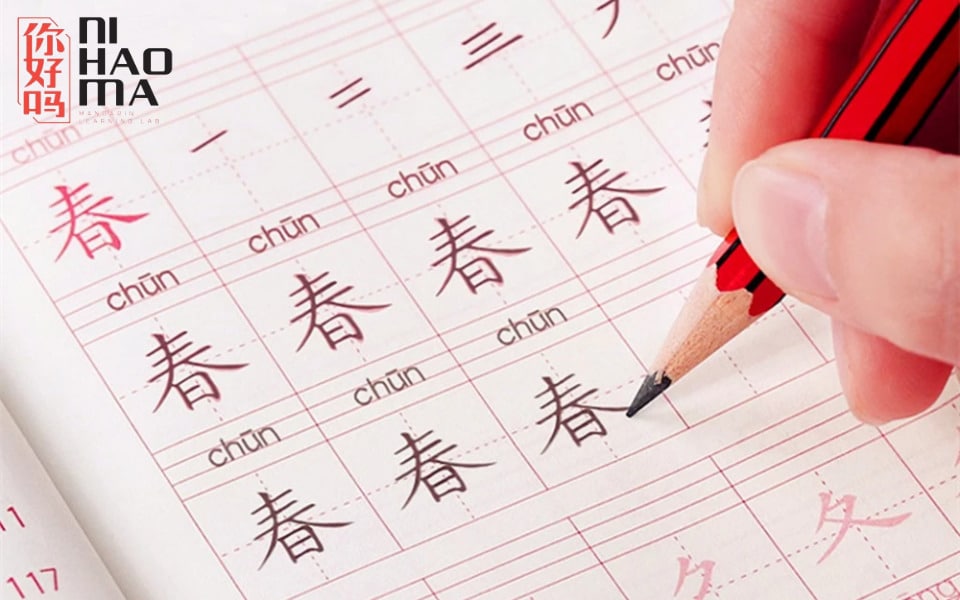
| No | Chinese | Pinyin | English | Examples |
|---|---|---|---|---|
| 171 | 年级 | niánjí | grade (in school) | 我是三年级学生。(wǒ shì sān niánjí xuéshēng. – I am a third-grade student.) |
| 172 | 年轻 | niánqīng | young | 他很年轻。(tā hěn niánqīng. – He is very young.) |
| 173 | 鸟 | niǎo | bird | 天上有很多鸟。(tiānshàng yǒu hěn duō niǎo. – There are many birds in the sky.) |
| 174 | 努力 | nǔlì | to strive, to work hard | 你要努力学习。(nǐ yào nǔlì xuéxí. – You must study hard.) |
| 175 | 爬山 | páshān | to climb a mountain | 周末我们去爬山吧。(zhōumò wǒmen qù páshān ba. – Let’s go mountain climbing this weekend.) |
| 176 | 盘子 | pánzi | plate, dish | 请把盘子洗干净。(qǐng bǎ pánzi xǐ gānjìng. – Please wash the plate clean.) |
| 177 | 胖 | pàng | fat, plump | 他有点儿胖。(tā yǒudiǎnr pàng. – He is a bit fat.) |
| 178 | 啤酒 | píjiǔ | beer | 我不喝啤酒。(wǒ bù hē píjiǔ. – I don’t drink beer.) |
| 179 | 皮鞋 | píxié | leather shoes | 他穿了一双新皮鞋。(tā chuān le yī shuāng xīn píxié. – He wore a new pair of leather shoes.) |
| 180 | 瓶子 | píngzi | bottle | 桌子上有一个瓶子。(zhuōzi shàng yǒu yī gè píngzi. – There is a bottle on the table.) |
| 181 | 其实 | qíshí | actually, in fact | 其实他不懂。(qíshí tā bù dǒng. – Actually, he doesn’t understand.) |
| 182 | 其他 | qítā | other, else | 其他人呢?(qítā rén ne? – Where are the others?) |
| 183 | 骑 | qí | to ride (a bicycle, horse) | 我喜欢骑自行车。(wǒ xǐhuān qí zìxíngchē. – I like riding a bicycle.) |
| 184 | 奇怪 | qíguài | strange, odd | 这个人很奇怪。(zhège rén hěn qíguài. – This person is very strange.) |
| 185 | 起来 | qǐlái | to get up, (directional complement indicating upward movement or beginning of action) | 快起来!(kuài qǐlái! – Get up quickly!) |
| 186 | 起飞 | qǐfēi | to take off (of a plane) | 飞机起飞了。(fēijī qǐfēi le. – The plane has taken off.) |
| 187 | 清楚 | qīngchu | clear, distinct | 你说清楚一点。(nǐ shuō qīngchu yīdiǎn. – Please speak a bit more clearly.) |
| 188 | 请假 | qǐngjià | to ask for leave | 我想请假三天。(wǒ xiǎng qǐngjià sān tiān. – I want to ask for three days off.) |
| 189 | 秋 | qiū | autumn, fall | 秋天很美。(qiūtiān hěn měi. – Autumn is beautiful.) |
| 190 | 裙子 | qúnzi | skirt | 这条裙子真漂亮。(zhè tiáo qúnzi zhēn piàoliang. – This skirt is really beautiful.) |
| 191 | 然后 | ránhòu | then, afterwards | 我先吃饭,然后看电影。(wǒ xiān chīfàn, ránhòu kàn diànyǐng. – I’ll eat first, then watch a movie.) |
| 192 | 热情 | rèqíng | enthusiasm, passionate | 她对工作很热情。(tā duì gōngzuò hěn rèqíng. – She is very enthusiastic about her work.) |
| 193 | 认为 | rènwéi | to think, to believe | 我认为他说得对。(wǒ rènwéi tā shuō de duì. – I think what he said is right.) |
| 194 | 认真 | rènzhēn | serious, conscientious, earnest | 他学习很认真。(tā xuéxí hěn rènzhēn. – He studies very conscientiously.) |
| 195 | 容易 | róngyì | easy | 这道题很容易。(zhè dào tí hěn róngyì. – This question is very easy.) |
| 196 | 如果 | rúguǒ | if, in case | 如果下雨,我们就不去了。(rúguǒ xiàyǔ, wǒmen jiù bù qù le. – If it rains, we won’t go.) |
| 197 | 伞 | sǎn | umbrella | 下雨了,带伞了吗?(xiàyǔ le, dài sǎn le ma? – It’s raining, did you bring an umbrella?) |
| 198 | 上网 | shàngwǎng | to go online, to surf the internet | 我喜欢上网看新闻。(wǒ xǐhuān shàngwǎng kàn xīnwén. – I like to go online to read the news.) |
| 199 | 生气 | shēngqì | to get angry | 他生气了。(tā shēngqì le. – He got angry.) |
| 200 | 声音 | shēngyīn | sound, voice | 她的声音很好听。(tā de shēngyīn hěn hǎotīng. – Her voice is very pleasant to listen to.) |
| 201 | 试 | shì | to try | 我想试一下这件衣服。(wǒ xiǎng shì yīxià zhè jiàn yīfu. – I want to try on this dress.) |
| 202 | 世界 | shìjiè | world | 世界很大。(shìjiè hěn dà. – The world is very big.) |
| 203 | 瘦 | shòu | thin, lean | 她变瘦了。(tā biàn shòu le. – She has become thinner.) |
| 204 | 舒服 | shūfu | comfortable, well | 我今天不舒服。(wǒ jīntiān bù shūfu. – I’m not feeling well today.) |
| 205 | 叔叔 | shūshu | uncle (father’s younger brother) | 叔叔好!(shūshu hǎo! – Hello, uncle!) |
| 206 | 树 | shù | tree | 院子里有棵大树。(yuànzi lǐ yǒu kē dà shù. – There’s a big tree in the yard.) |
| 207 | 数学 | shùxué | mathematics | 我喜欢数学。(wǒ xǐhuān shùxué. – I like mathematics.) |
| 208 | 刷牙 | shuāyá | to brush teeth | 每天早上我都会刷牙。(měitiān zǎoshàng wǒ dōu huì shuāyá. – I brush my teeth every morning.) |
| 209 | 双 | shuāng | pair, double | 我买了一双鞋。(wǒ mǎi le yī shuāng xié. – I bought a pair of shoes.) |
| 210 | 水平 | shuǐpíng | level, standard | 他的汉语水平很高。(tā de Hànyǔ shuǐpíng hěn gāo. – His Chinese level is very high.) |
| 211 | 司机 | sījī | driver | 司机开车很快。(sījī kāichē hěn kuài. – The driver drives very fast.) |
| 212 | 太阳 | tàiyáng | sun | 太阳出来了。(tàiyáng chūlái le. – The sun is out.) |
| 213 | 特别 | tèbié | especially, particularly | 我特别喜欢你。(wǒ tèbié xǐhuān nǐ. – I particularly like you.) |
| 214 | 疼 | téng | painful, to hurt | 我的头很疼。(wǒ de tóu hěn téng. – My head hurts a lot.) |
| 215 | 提高 | tígāo | to improve, to raise | 我想提高汉语水平。(wǒ xiǎng tígāo Hànyǔ shuǐpíng. – I want to improve my Chinese level.) |
| 216 | 体育 | tǐyù | sports, physical education | 我喜欢上体育课。(wǒ xǐhuān shàng tǐyù kè. – I like to attend PE class.) |
| 217 | 甜 | tián | sweet | 这个西瓜很甜。(zhège xīguā hěn tián. – This watermelon is very sweet.) |
| 218 | 条 | tiáo | (measure word for long, thin objects) | 这条路很长。(zhè tiáo lù hěn cháng. – This road is very long.) |
| 219 | 同事 | tóngshì | colleague | 她是我的同事。(tā shì wǒ de tóngshì. – She is my colleague.) |
| 220 | 同意 | tóngyì | to agree | 我同意你的看法。(wǒ tóngyì nǐ de kànfǎ. – I agree with your opinion.) |
| 221 | 头发 | tóufa | hair | 她的头发很长。(tā de tóufa hěn cháng. – Her hair is very long.) |
| 222 | 突然 | tūrán | suddenly | 他突然出现了。(tā tūrán chūxiàn le. – He suddenly appeared.) |
| 223 | 图书馆 | túshūguǎn | library | 我要去图书馆看书。(wǒ yào qù túshūguǎn kànshū. – I want to go to the library to read books.) |
| 224 | 腿 | tuǐ | leg | 他的腿很长。(tā de tuǐ hěn cháng. – His legs are very long.) |
| 225 | 完成 | wánchéng | to complete, to finish | 我完成了作业。(wǒ wánchéng le zuòyè. – I finished my homework.) |
| 226 | 碗 | wǎn | bowl | 请给我一个碗。(qǐng gěi wǒ yī gè wǎn. – Please give me a bowl.) |
| 227 | 万 | wàn | ten thousand | 一万块钱。(yī wàn kuài qián. – Ten thousand yuan.) |
| 228 | 忘记 | wàngjì | to forget | 我忘记带钥匙了。(wǒ wàngjì dài yàoshi le. – I forgot to bring my key.) |
| 229 | 为 | wèi | for, because of | 这是为你做的。(zhè shì wèi nǐ zuò de. – This is made for you.) |
| 230 | 为了 | wèile | in order to, for the sake of | 为了学习,他很努力。(wèile xuéxí, tā hěn nǔlì. – In order to study, he works very hard.) |
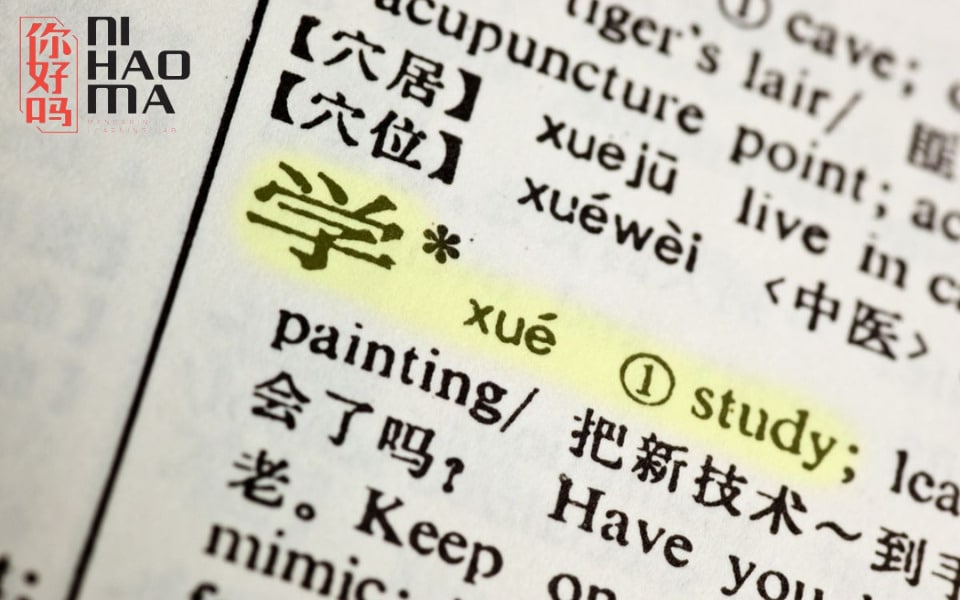
| No | Chinese | Pinyin | English | Examples |
| 231 | 位 | wèi | polite measure word for people | 这是一位老师。(zhè shì yī wèi lǎoshī. – This is a teacher (polite).) |
| 232 | 文化 | wénhuà | culture | 中国文化很有趣。(Zhōngguó wénhuà hěn yǒu qù. – Chinese culture is very interesting.) |
| 233 | 西 | xī | west | 商店在西边。(shāngdiàn zài xī biān. – The shop is on the west side.) |
| 234 | 习惯 | xíguàn | habit | 我有一个好习惯。(wǒ yǒu yī gè hǎo xíguàn. – I have a good habit.) |
| 235 | 洗手间 | xǐshǒujiān | restroom | 请问洗手间在哪儿?(qǐngwèn xǐshǒujiān zài nǎr? – Excuse me, where is the restroom?) |
| 236 | 洗澡 | xǐzǎo | to take a shower/bath | 我要洗澡了。(wǒ yào xǐzǎo le. – I’m going to take a shower.) |
| 237 | 夏 | xià | summer | 夏天很热。(xiàtiān hěn rè. – Summer is very hot.) |
| 238 | 先 | xiān | first | 你先走吧。(nǐ xiān zǒu ba. – You go first.) |
| 239 | 香蕉 | xiāngjiāo | banana | 我喜欢吃香蕉。(wǒ xǐhuān chī xiāngjiāo. – I like to eat bananas.) |
| 240 | 相信 | xiāngxìn | to believe | 我相信你。(wǒ xiāngxìn nǐ. – I believe you.) |
| 241 | 向 | xiàng | towards | 请向前走。(qǐng xiàng qián zǒu. – Please walk forward.) |
| 242 | 像 | xiàng | to be like, to resemble | 她长得真像她妈妈。(tā zhǎng de zhēn xiàng tā māma. – She really looks like her mother.) |
| 243 | 小心 | xiǎoxīn | to be careful | 小心!(xiǎoxīn! – Be careful!) |
| 244 | 校长 | xiàozhǎng | principal, headmaster | 校长在开会。(xiàozhǎng zài kāihuì. – The principal is in a meeting.) |
| 245 | 新闻 | xīnwén | news | 我每天看新闻。(wǒ měitiān kàn xīnwén. – I watch the news every day.) |
| 246 | 新鲜 | xīnxiān | fresh | 这些水果很新鲜。(zhèxiē shuǐguǒ hěn xīnxiān. – These fruits are very fresh.) |
| 247 | 信用卡 | xìnyòngkǎ | credit card | 我用信用卡支付。(wǒ yòng xìnyòngkǎ zhīfù. – I paid with a credit card.) |
| 248 | 行李箱 | xínglixiāng | suitcase, trunk | 我的行李箱很重。(wǒ de xínglixiāng hěn zhòng. – My suitcase is very heavy.) |
| 249 | 熊猫 | xióngmāo | panda | 熊猫很可爱。(xióngmāo hěn kě’ài. – Pandas are very cute.) |
| 250 | 需要 | xūyào | to need | 我需要你的帮助。(wǒ xūyào nǐ de bāngzhù. – I need your help.) |
| 251 | 选择 | xuǎnzé | choice, to choose | 你有什么选择?(nǐ yǒu shénme xuǎnzé? – What choices do you have?) |
| 252 | 要求 | yāoqiú | requirement, to request | 他的要求不高。(tā de yāoqiú bù gāo. – His requirements aren’t high.) |
| 253 | 爷爷 | yéye | paternal grandfather | 我和爷爷去公园。(wǒ hé yéye qù gōngyuán. – My grandpa and I went to the park.) |
| 254 | 一定 | yídìng | certainly, definitely | 他一定会来。(tā yídìng huì lái. – He will definitely come.) |
| 255 | 一共 | yígòng | altogether | 一共多少钱?(yígòng duōshǎo qián? – How much altogether?) |
| 256 | 一会儿 | yíhuìr | a while, a moment | 请等一会儿。(qǐng děng yíhuìr. – Please wait a moment.) |
| 257 | 一样 | yíyàng | same, alike | 我们长得不一样。(wǒmen zhǎng de bù yíyàng. – We don’t look the same.) |
| 258 | 以前 | yǐqián | before, formerly | 以前我很喜欢看电影。(yǐqián wǒ hěn xǐhuān kàn diànyǐng. – Before, I really liked watching movies.) |
| 259 | 一般 | yìbān | generally, usually | 我一般周末在家。(wǒ yìbān zhōumò zài jiā. – I’m usually home on weekends.) |
| 260 | 一边 | yìbiān | while, at the same time | 他一边吃饭一边看电视。(tā yìbiān chīfàn yìbiān kàn diànshì. – He ate while watching TV.) |
| 261 | 一直 | yìzhí | always, continuously | 他一直在学习。(tā yìzhí zài xuéxí. – He has always been studying.) |
| 262 | 音乐 | yīnyuè | music | 我喜欢听音乐。(wǒ xǐhuān tīng yīnyuè. – I like to listen to music.) |
| 263 | 银行 | yínháng | bank | 我要去银行取钱。(wǒ yào qù yínháng qǔqián. – I want to go to the bank to withdraw money.) |
| 264 | 饮料 | yǐnliào | beverage, drink | 你想喝什么饮料?(nǐ xiǎng hē shénme yǐnliào? – What drink would you like to have?) |
| 265 | 应该 | yīnggāi | should, ought to | 你应该多休息。(nǐ yīnggāi duō xiūxi. – You should rest more.) |
| 266 | 影响 | yǐngxiǎng | influence, to affect | 吸烟会影响健康。(xīyān huì yǐngxiǎng jiànkāng. – Smoking will affect health.) |
| 267 | 用 | yòng | to use | 我用筷子吃饭。(wǒ yòng kuàizi chīfàn. – I use chopsticks to eat.) |
| 268 | 游戏 | yóuxì | game | 我喜欢玩游戏。(wǒ xǐhuān wán yóuxì. – I like to play games.) |
| 269 | 有名 | yǒumíng | famous | 他是一个很有名的演员。(tā shì yī gè hěn yǒumíng de yǎnyuán. – He is a very famous actor.) |
| 270 | 又 | yòu | again (for repeated actions) | 他又来了。(tā yòu lái le. – He came again.) |

| No | Chinese | Pinyin | English | Examples |
| 271 | 遇到 | yùdào | to encounter, to meet | 我今天遇到了一个老朋友。(wǒ jīntiān yùdào le yī gè lǎo péngyou. – Today I encountered an old friend.) |
| 272 | 元 | yuán | Yuan (Chinese currency unit) | 这件衣服十元。(zhè jiàn yīfu shí yuán. – This piece of clothing is ten yuan.) |
| 273 | 愿意 | yuànyì | to be willing | 我愿意帮助你。(wǒ yuànyì bāngzhù nǐ. – I am willing to help you.) |
| 274 | 月亮 | yuèliang | moon | 今晚的月亮很圆。(jīnwǎn de yuèliang hěn yuán. – Tonight’s moon is very full.) |
| 275 | 越 | yuè | the more… the more… | 你越学习,越聪明。(nǐ yuè xuéxí, yuè cōngming. – The more you study, the smarter you become.) |
| 276 | 站 | zhàn | to stand, station | 请站起来。(qǐng zhàn qǐlái. – Please stand up.) |
| 277 | 张 | zhāng | Zhang (surname), (measure word for flat objects) | 我有一张照片。(wǒ yǒu yī zhāng zhàopiàn. – I have one picture.) |
| 278 | 长(动词) | zhǎng | to grow | 孩子长高了。(háizi zhǎng gāo le. – The child has grown taller.) |
| 279 | 着急 | zháojí | to worry, anxious | 你不要着急。(nǐ bùyào zháojí. – Don’t worry.) |
| 280 | 照顾 | zhàogù | to look after, to care for | 谢谢你照顾我。(xièxie nǐ zhàogù wǒ. – Thank you for looking after me.) |
| 281 | 照片 | zhàopiàn | photo | 这是一张老照片。(zhè shì yī zhāng lǎo zhàopiàn. – This is an old photo.) |
| 282 | 照相机 | zhàoxiàngjī | camera | 我想买一台照相机。(wǒ xiǎng mǎi yī tái zhàoxiàngjī. – I want to buy a camera.) |
| 283 | 只(量词) | zhī | (measure word for certain animals) | 我有一只猫。(wǒ yǒu yī zhī māo. – I have one cat.) |
| 284 | 只(副词) | zhǐ | only | 我只想睡觉。(wǒ zhǐ xiǎng shuìjiào. – I only want to sleep.) |
| 285 | 只有……才…… | zhǐyǒu…cái… | only if… then… | 只有你努力,才能成功。(zhǐyǒu nǐ nǔlì, cái néng chénggōng. – Only if you work hard, then can you succeed.) |
| 286 | 中文 | zhōngwén | Chinese language | 我在学中文。(wǒ zài xué Zhōngwén. – I’m learning Chinese.) |
| 287 | 中间 | zhōngjiān | middle, in between | 椅子在桌子中间。(yǐzi zài zhuōzi zhōngjiān. – The chair is in the middle of the table.) |
| 288 | 终于 | zhōngyú | finally | 我终于找到他了。(wǒ zhōngyú zhǎodào tā le. – I finally found him.) |
| 289 | 种 | zhǒng | kind, type, species | 你喜欢哪种颜色?(nǐ xǐhuān nǎ zhǒng yánsè? – Which kind of color do you like?) |
| 290 | 重要 | zhòngyào | important | 这件事很重要。(zhè jiàn shì hěn zhòngyào. – This matter is very important.) |
| 291 | 周末 | zhōumò | weekend | 周末你有什么计划?(zhōumò nǐ yǒu shénme jìhuà? – What are your plans for the weekend?) |
| 292 | 主要 | zhǔyào | main, primary | 主要原因是什么?(zhǔyào yuányīn shì shénme? – What is the main reason?) |
| 293 | 注意 | zhùyì | to pay attention, to notice | 请注意安全。(qǐng zhùyì ānquán. – Please pay attention to safety.) |
| 294 | 自己 | zìjǐ | oneself | 我自己做饭。(wǒ zìjǐ zuòfàn. – I cook by myself.) |
| 295 | 自行车 | zìxíngchē | bicycle | 我有一辆自行车。(wǒ yǒu yī liàng zìxíngchē. – I have a bicycle.) |
| 296 | 总是 | zǒngshì | always | 他总是很忙。(tā zǒngshì hěn máng. – He is always busy.) |
| 297 | 嘴 | zuǐ | mouth | 他的嘴巴很大。(tā de zuǐba hěn dà. – His mouth is very big.) |
| 298 | 最后 | zuìhòu | last, finally | 他最后一个来。(tā zuìhòu yī gè lái. – He was the last one to come.) |
| 299 | 最近 | zuìjìn | recently, lately | 你最近好吗?(nǐ zuìjìn hǎo ma? – How have you been recently?) |
| 300 | 作业 | zuòyè | homework | 我还没做完作业。(wǒ hái méi zuò wán zuòyè. – I haven’t finished my homework yet.) |
See more: Full HSK 2 Vocabulary List
Conclusion
Learning Chinese, especially HSK 3 vocabulary, becomes easier with a smart learning method and suitable resources. With this list of 600 HSK 3 vocabulary words and examples, you now have a useful tool to support your learning journey. We hope Ni Hao Ma has provided you with beneficial knowledge. Don’t forget to save this article for review!
